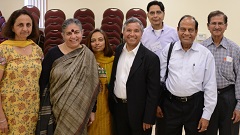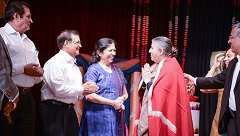 |
Dr. Vandana Shiva-International Farmer’s Rights Activist, Visits the Jain Center of Southern California
Los Angeles, November 8, 2014
By Nisha Vida/
NRIpress-Club
On November 8, 2014, the Jain Center of Southern California in Buena Park hosted international human rights and farmer’s rights advocate Dr. Vandana Shiva to address an audience of over 450 people. The audience included many Jain Center members and many other members of the public, drawn to the Jain Center by Dr. Shiva’s commitment to ensuring human rights, environmental sustainability, and protection over the livelihoods of small farmers in India. Jain Center President Dr. Jayesh Shah moderated the talk. The Jain Center provided a free, vegetarian lunch, thanks to a generous donation by Mr. Avadhesh & Mrs. Uma Agarwal from Agarwal Family Foundation. Mr. Manubhai & Mrs Rika Shah from Sarva Mangal Trust sponsored the auditorium. Mr. Anil Parekh, Realtor from Century 21 made immense contributions for the smooth flow of events.

CLICK FOR BIGGER VIEW
Dr. Shiva is founder of India-based nonprofit Navdanya, which has established a network of 700,000 farmers across India, builds community seed banks, and trains farmers in organic and biodiverse farming practices. Navdanya works with the widows of the over 250,000 Indian farmers that have committed suicide, helping train them in organic farming practices, and working with them to grow their own cotton, weave and dye their own fabrics to earn a profitable living. Navdanya also hosts the A-Z of Farming and Agro-Ecology, a one-month intensive course that teaches strategies to nourish soils and encourage biodiversity by seed saving and planting many types of nutrient rich, organic crops that attract pollinator birds and insects. Students travel to Dehradun, where Dr. Shiva’s farm is, from around the world to attend this course.

CLICK FOR BIGGER VIEW
The name Navdanya came to Dr. Shiva when she was traveling through a remote part of India and happened upon a tribal person’s small farm. She noticed that he was growing a diverse set of crops and asked him about his farm. He said that he was growing Navdanya, meaning nine seeds. He explained that he plants nine crops, rotating what crops he grows with the seasons. He plants nine varieties to honor the nine planets and to connect the Earth that grows his plants to the cosmos above us. Dr. Shiva also found meaning in the word Navdanya, which can also mean ‘new gift,’ which she hopes her work can be to the communities she works with and to the environment.

CLICK FOR BIGGER VIEW
Dr. Shiva tirelessly fights for ‘seed freedom,’ human rights and rights for the Earth because she has found a connection between farming practices, income inequality, environmental health, and violence in society. She talked about how of the 250 million people going hungry in India, half of those people are farmers, that every 30 minutes a farmer in India commits suicide, often by drinking pesticide, that every fourth person in India is going hungry in a nation that has a huge agricultural sector, and that India is a nation that continues to suffer from extreme rates of child malnutrition.
In her talk, Dr. Shiva wove the Jain concern with violence into an explanation of her work advocating for farmer’s rights and seed sovereignty. She began her talk by describing how Jain tenets opened her eyes to the violence that has infiltrated society, particularly the modern industrial agriculture system. About a decade after returning to India upon completing a PhD in Physics at the University of Western Ontario, Canada, she returned to an India erupting with riots in Punjab, resulting in part from joblessness in the wake of the Green Revolution. Later that year, a Union Carbide pesticide plant leaked in Bhopal, instantly killing 300,000 people. Dow Chemical Company now owns Union Carbide. These events triggered Dr. Shiva’s desire to investigate transformations in Indian agriculture and the impact of these on farmers, the environment, and human health.
Dr. Shiva focused her discussion on how her work has shown her that modern industrial agriculture is a farming method that is not in the interests of the farmers, is damaging to the environment, and lacks the nutritional qualities that traditional farming practices provided. She discussed the epidemic of farmer suicides in India to provide some context for her discussion. Every thirty minutes, a farmer in India commits suicide. Dr. Shiva talked about how policies in India have encouraged farmers to forgo ancient farming methods and to stop saving seeds their families developed over many generations. The policies have encouraged farmers to instead switch to modern industrial agriculture practices, which require intensive capital investment into chemical inputs and patented seeds that they are contractually obligated to repurchase every year. Farmers started falling into debt and killing themselves in the hundreds of thousands.
Dr. Shiva explained the three main components of modern industrial agriculture. First, modern industrial agriculture requires heavy use of expensive chemical fertilizers, pesticides, and herbicides. These chemical inputs were designed for chemical warfare and use in concentration camps during the World Wars. Chemical companies then repurposed chemical weapons for agricultural purposes to make profit by waging war on insects – all insects – including bees, butterflies and other pollinators crucial to food production. Pesticides indiscriminately kill all life forms they come into contact with.
Second, Dr. Shiva discussed how modern agriculture depends on a monoculture farming system. Monoculture farming means that only one crop is planted on large land plots, necessitating chemical inputs. In nature and on traditional farms, many different plants grow together. Lack of diverse planting methods means that crops are vulnerable to insect infestation, requiring pesticides. Crop diversity limits crop destruction, because if drought or pests kill one plant variety, there are many other plant varieties that can continue to provide food. Crop diversity also ensures healthy soils that are not depleted from over-farming of one crop only, requiring fertilizers. Dr. Shiva also discussed how monoculture’s requirement of one crop only encourages use of herbicides to kill off all other plants. She talked about the destruction through herbicides of plants like amaranth (rajagira), of which 200 varieties grow wild in India, and which have traditionally provided a source of food for rural people to eat and sell for income. Dr. Shiva discussed how Jains were the world’s first people to recognize microbes and to value their lives and pointed out that use of chemical fertilizers kills soil microbes. Dr. Shiva thus linked the use of these chemical inputs not only to destruction of soils, microbes and insects, but also to human life and human livelihoods.
The third component of modern agriculture that Dr. Shiva discussed was genetically modified organisms (GMOs), focusing on GMO seeds, which have been planted as agricultural crops for human and animal consumption for only about 20 year since the mid-1990s. Dr. Shiva discussed how the process of genetic engineering required to create a GMO seed is inherently violent. Scientists select a gene from one species, attach it to a gold particle, and use a gene gun to shoot the gene into the DNA of another organism, rupturing its self-organization. Organisms tend to suppress foreign genes, so scientists also insert a highly virulent virus into the genetically engineered organism to force the inserted gene to express itself. The most common GMO seeds on the market are genetically engineered to produce their own pesticides and withstand chemical herbicides, such as Monsanto’s RoundUp Ready.
Dr. Shiva concluded by explaining why she is fighting for seed freedom – seed sathyagraha – and how Gandhiji’s work inspires her own efforts. She shared the story about why Gandhi chose the spinning wheel as a focus of his efforts for how to gain independence from the British raj. When asked, Gandhi said that he focused on the spinning wheel because it was so small and cheap that even the poorest worker woman in the poorest village could have one. By spinning her own cloth, she would gain independence and freedom from the British who took all of India’s cotton to have processed in English factories and resold at high costs to Indian people.
Like the spinning wheel, Indian farming families and village communities have saved their own seeds and planted diverse arrays of crops acclimatized to local soils and dietary needs. Dr. Shiva is dedicated to preserving these ancient traditions, to scientifically analyzing how they ensure healthy soils and nutritious foods, and to helping communities earn profit from producing foods and textiles utilizing sustainable, organic agriculture methods.
To learn more about Dr. Shiva’s work, visit the Navdanya website. To support Dr. Shiva’s work from within the United States, please visit the Friends of Navdanya website, which also contains information about Dr. Shiva and Navdanya’s work.
AUTHOR BIO:
Nisha Vida is a researcher, writer, artist and teacher. She was born in South Africa and raised in Los Angeles. Her great-grandparents were born in villages in Gujurat. Vida is recipient of a Fulbright research fellowship to Brazil. She has been deeply involved in ensuring access of quality, healthy foods for all people. She is an organizer of Dr. Vandana Shiva's project Seed Freedom Los Angeles and is associate producer of documentary film GMO OMG. She is also an LA County Master Gardener, has helped start school gardens and has taught inner city youth how to grow and prepare their own food. She is currently pursuing a joint law degree and master’s in public policy at UCLA.

|